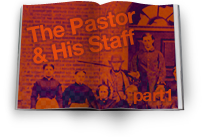Dear Associate Pastor, Sincerely, a Former Associate Pastor
So you’ve been called by a congregation to serve as an associate pastor. Now what?
Chances are the church has attached a tagline to your title: associate pastor for _________. This allows everyone to know the scope of your responsibility.
Yet at least as important as what follows the word “pastor” in your title is the word that comes before it: associate.
To be associated is to be closely connected to someone. It means you’re there fundamentally to help the senior/lead pastor in his work, rather than simply accomplish an independent job.
I spent about ten years serving as an associate before taking on the responsibilities of a senior pastor. What follows are three things you should remember in order to serve your pastor, regardless of the specifics of your job description.
IT’S THE SENIOR PASTOR’S CHURCH, NOT YOURS
When a church calls a senior or lead pastor, they call a man who will not only preach regularly, but who will set the overall vision and direction of the church through his preaching and leadership.
Now before you cry foul and hold up the biblical doctrine of a plurality of elders—a doctrine I gladly affirm—let me add that I’m simply making a practical observation. Most churches can afford to have only one elder in the employ of the church, and he’s the elder who carries the main burden of the pulpit ministry. Therefore, his preaching and leadership will decisively shape the direction of the church.
When a church grows to the point of adding another elder to the staff, the preaching elder’s job description usually doesn’t change, except for the few things he can now take of his plate. The congregation will still expect the now “senior” pastor—rightly—to carry on with his preaching and leadership. After all, it was his leadership that grew the congregation to the point of needing another pastor.
What that means for you, his associate, is that you are not called to steer the congregation in a new or better direction. Rather, your job is to help him better lead the congregation in the direction he’s already going. Your job is to protect and foster the congregation’s support of the senior pastor, rather than develop your own independent following.
That might seem obvious, but it’s harder than you think. No matter how close you are to your senior pastor, there will be points where you disagree. And the temptation of your heart will be to envy the love and affection the congregation has for him.
If you are not convinced that the most important priority for the congregation is their ability to hear and profit from the senior pastor’s preaching, and if you’re not convinced that he’s the man for the job, then you will inevitably begin to compete with him for leadership or affection or both.
When that happens, no matter how well you’re doing other parts of your job, you are failing to serve as an associate pastor. Instead, you have become a rival pastor in the midst of the congregation, and that will not serve anyone well.
Of course, if the senior pastor is guilty of immorality or serious doctrinal error, then his leadership in the church is forfeit. In that case, you’ll need to very carefully bring the matter to the attention of the other elders. But they must take the lead, lest the appearance of insubordination obscure the real issue.
But in most cases where insubordination wrecks the relationship between senior and associate pastor, immorality and error are not the issue. Pride is.
If you’re an associate pastor, never forget that, in the providence of God, it’s his church, not yours.
IT’S NOT JUST HIS CHURCH, IT’S YOURS TOO
There are two words in the title “associate pastor” but only one of them is a noun. That means if you’re an associate pastor, you may not be “The Pastor” but you are definitely a pastor, an elder and overseer in your local church. The New Testament is full of instructions for elders, and those instructions apply to you as much as they apply to the senior pastor.
As an associate pastor, it’s all too easy to take on the mentality of an employee. You may think you’re there to do a job, to carry out instructions, to accomplish set tasks. But that’s not the mentality of an elder. According to Hebrews 13:17, overseers are men who keep watch over the flock and who will give an account to the Chief Shepherd (not the personnel committee) for their work. Ephesians 4:11-13 tells us that elders prepare and equip God’s people. And 1 Peter 5:1-4 reminds us that elders must be eager to serve and to provide examples for others to follow. These aren’t the attitudes of employees, but owners. You’re not just minding the store, you want to see the church grow and flourish. You’re not babysitting someone else’s kids, you’re raising a family.
As one of the elders, and particularly as an associate pastor, you want to develop significant ministry within the church. Not ministry that competes with the senior pastor, but ministry that obviously complements and extends his overarching ministry of the Word. At Capitol Hill Baptist, where I served for almost nine years, I was called to be the second teaching pastor of the church in order to provide help and rest for Mark Dever. Fairly quickly and as much to my surprise as everyone else’s, I developed a counseling ministry that complemented what Mark was doing from the pulpit. As that ministry—in addition to my own preaching—impacted the congregation, I was able to function more and more as a pastor and elder, and not just a staff member. And that served the senior pastor. It not only lightened his burden, but it extended his work. He had a fellow stake-holder working with him, not just another employee he had to manage.
So take some initiative. Don’t give in to the temptation to laziness or the fear of failure. As one of the elders, grow and develop the ministry of your local church. It’s not just his church, it’s yours too. And the day will come when you have to give an account for it.
IT’S NEITHER HIS CHURCH NOR YOURS, IT’S CHRIST’S
In his letter to the Ephesians, Paul quotes from Psalm 68:18, “When he ascended on high, he led captives in his train and gave gifts to men.” In the verses that follow, Paul makes clear that among those gifts that Christ has given to his church are men: apostles, prophets, evangelists, and pastor-teachers. The purpose of these men is that the body of Christ would be built up into maturity, “attaining to the whole measure of the fullness of Christ” (Eph 4:7-13).
So whether you’re the senior pastor or the associate pastor, at the end of the day, you are a gift from Christ to his bride, the church. In some ways, what John the Baptist said of himself applies to us as ministers. “The bride belongs to the bridegroom. The friend who attends the bridegroom waits and listens for him, and is full of joy when he hears the bridegroom’s voice. That joy is mine, and it is now complete” (Jn. 3:29).
It’s so easy to become jealous for the bride’s affection and to see other pastors as competitors for her esteem. But we need to remember that the local church we serve is not our bride. She is Christ’s bride, and we are only one of the engagement gifts he intends to give her in preparation for the big day of his coming.
When that’s our perspective, our joy is made complete whenever we see the bride grow in her affection for Jesus. If that happens through our ministry, then we are blessed. But if it happens even more through another pastor’s ministry, then our joy is not diminished, but increased.
So put aside the pride, the petty jealousy, the jockeying for position that too often characterizes the relationships between senior and associate pastors. Find your joy in the church’s love for Christ, not you. And pray for the day when your joy is complete, the day on which you, together with the local church you serve, are presented to Christ as “a radiant church, without stain or wrinkle or any other blemish, but holy and blameless” (Eph. 5:27).









